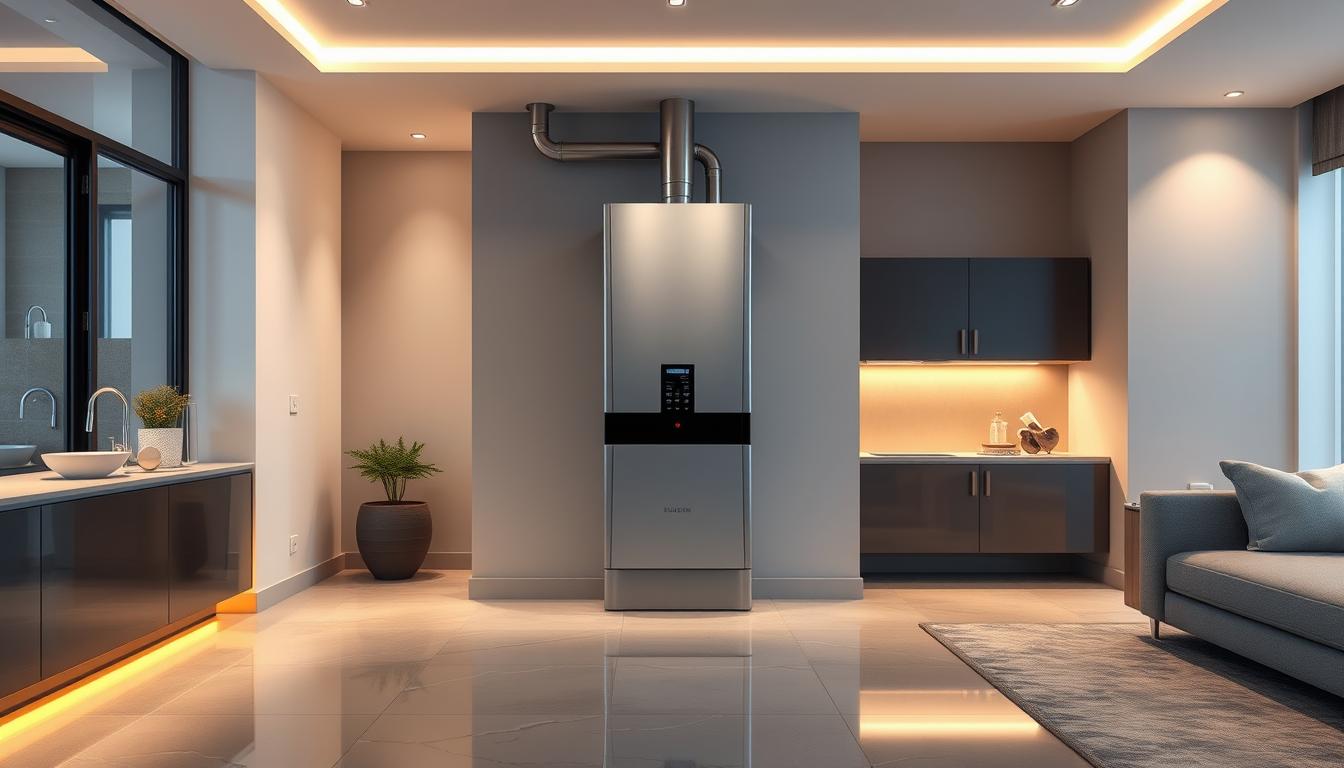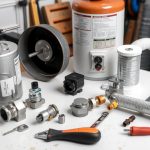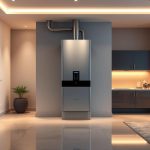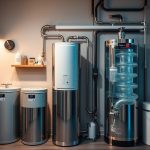Think on never running out of hot water on an icy winter morning. Or not having to stress about sky-high energy bills. The perfect boiler hot water heater is not just good to have in your home. With the price of energy on the rise, people are turning to smarter, cost-effective ways to heat and get hot water. Thanks to modern energy-efficient water heaters, the way we heat our homes is changing. These new boiler hot water heaters provide you with quick, constant hot water and reduce your energy use. With the latest tech, you can be comfortable and cost-effective. Today’s homeowners are looking out for the planet and their wallets. The best boiler hot water heater not only protects you from the life threats posed by carbon monoxide but also your pocket.
Key Takeaways
- Can save up to 40% energy compared to boiler hot water heaters
- New systems provide endless hot water without energy loss
- Energy-Efficient Water Heaters Minimize utility bills as much as possible
- Comfort and environmental features combine advanced technologies
- Professional installation provides optimal system performance
Understanding Boiler Hot Water Heaters

boiler hot water heaters are among the best types for hot water system. They warm spaces and hot water. Those systems have made progress since standardized in 1915. If you want a single heat solution, boiler hot water heaters are wonderful. They retain temperature well, relying on their construction and engineering.
What Is a Boiler Hot Water Heater?
A boiler water heater provides both hot water and heat. It heats your house and your hot water. This is more efficient than the old, re-heaters.
- Generates heat for space warming
- Supplies hot water to your home
- Advanced Thermal Exchange technology powers the unit.
- Meets ASME Boiler and Pressure Vessel Code requirements
How Does It Work?
Putting in a boiler hot water heater is smart. It boils water in a central boiler. It then pushes the warm water through your home.
| System Component | Function | Efficiency Rating |
|---|---|---|
| Central Boiler | Water Heating | 95-103% |
| Distribution Network | Heat Circulation | 80-90% |
| Safety Valves | Pressure Regulation | 100% |
“Modern boiler hot water heaters are at the height of home heating technology, marrying efficiency to overall performance.” – HVAC Engineering Quarterly
Today’s condensing water heaters are super Thanks to improved design, they’re generally the most energy-efficient gas-fired water heater you can buy. Some don’t stop until they produce more energy than is put in to them—up to 103% efficiency. This is why it is the perfect option for the environmentally conscious.
Different Types of Boiler Hot Water Heaters
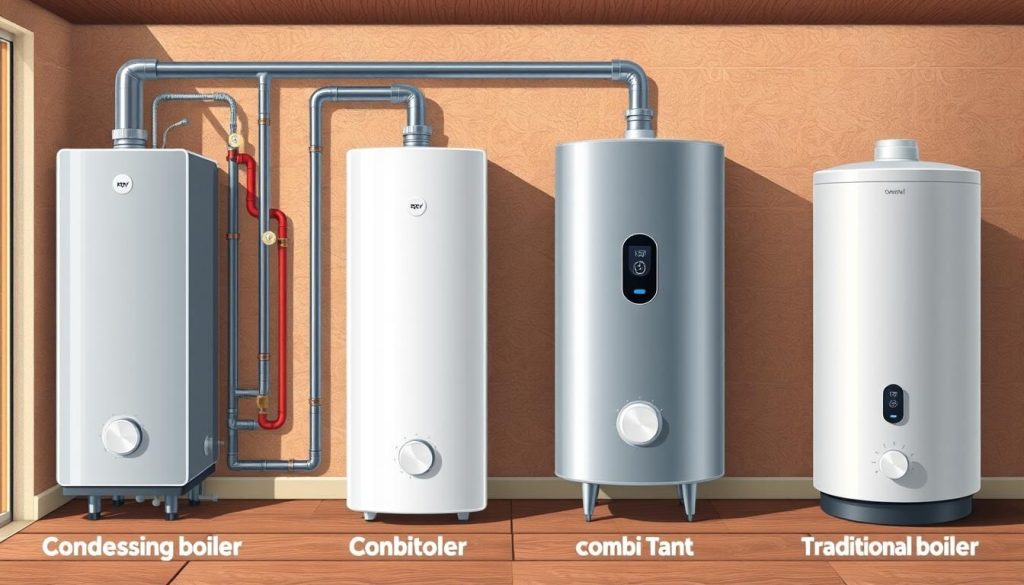
Homeowners have lots of choices when it comes time to choose boiler hot water heaters. Knowing the various types will help you make an informed decision so that you can choose wisely for your home. From compact gas water heaters to energy-efficient, tankless units, there’s a gas water heater to fit your needs.
- Combi Boilers
- System Boilers
- Regular Boilers
Combi Boilers
Combi boilers are a relatively new type of boiler for the home. They combine hot water and central heating in one unit. They heat water on demand, so you don’t need tanks. Good for tight spaces, they provide on-demand hot water and efficient heating.
System Boilers
System boilers come with a separate hot water tank. They work best for households that consumer more water. They are connected to the municipality’s water supply and save heated water in a reservoir. Gas models within this class remain a hot preference for their consistent output and capacity to supply hot water to every location in the house.
Conventional Boilers
Conventional Boilers require a cold water tank and a hot water cylinder. They’re not the sleekest, but for larger houses they’re fantastic. These heaters provide hot water to multiple bathrooms and fixtures.
| Boiler Type | Space Requirements | Hot Water Performance | Best Suited For |
|---|---|---|---|
| Combi Boilers | Compact | Instant | Small to Medium Homes |
| System Boilers | Medium | Stored | Medium to Large Homes |
| Regular Boilers | Large | Multiple Outlets | Large Homes, Complex Layouts |
Choosing the right boiler for your home With boiler size being such an important factor when it comes to installing a new heating system, it’s important to know how big a boiler you really need.
Advantages of a Boiler Hot Water System vs a Tank Water Heater

These days, owners are seeking out boilers for a heated swimming pool. All of these systems provide convenience, cost-saving, and functional advantages. They’re an over-and-above solution to traditional heating.
Energy-saving, Cost-saving Performance
It’s no longer necessary to bust your budget with an old-fashioned, oversized and over-priced heating system. Energy-efficient water heaters, in-home insulation and programmable thermostatsm put control in your hands and money back in your pockets. Boiler systems are efficient and economical. Chicago homeowners love them for:
- Retains heat for hours after you turn it off
- Lowering energy use
- Reducing monthly bills… Lessening carbon footprint
You’re right, natural gas boiler systems are exactly that and provide very evenly distributed heat boosted with excellent efficiency.” – Room Space Heater with ThermostatSilent Room Heater with ThermostatRemodeling
Space-Saving Design
the home heating system can be a daunting project. Boiler water heaters are great for this. They take up less space than old heating systems. The Navien combi-boilers are a good example. They consolidate heating and hot water into a single compact unit. Featuring a stainless steel heat exchanger, the boilers supply unmatched efficiency and space savings.
Selecting an energy-efficient water heater for your home can have benefits beyond saving money and reducing greenhouse gas emissions.
Key Features to Look For

Selecting the right water heater is paramount. You have to consider a few important factors. This makes it easy for homeowners to make informed decisions about installation and helps the water heater perform efficiently and safely. When considering water heating options:
Capacity and Size
The water heater capacity you need depends on your home size and hot water consumption. You should think about:
- The number of people in your family, and the amount of hot water you use in a day
- Now is the best time to use hot water
- Space to put the water heater in
- What your household really needs
Energy Ratings and Efficiency
Energy efficiency saves money. The government now has regulations to make water heaters more efficient. Some to-be-checked items are:
- ENERGY STAR certification
- Annual fuel utilization efficiency (AFUE)
- How Your PC Will Pay for It All
- How much energy it uses
Heating water accounts for around 20% of what most families spend on bills, so saving energy is a priority.
Vital Safety Features
Water heater installation involves safety and that is very important. Important safety parts include:
- Temperature and pressure relief valves
- Automatic shut-off mechanisms
- Materials that won’t rust
- Insulation to keep it safe
By knowing these key characteristics, homeowners can discover a water heater that not only operates efficiently but also conserves energy while keeping their family safe.
Installation of Boiler Hot Water Heaters

Installing a boiler hot water heater takes a lot of effort and competence. There are a lot of key steps in the process. These things can play a significant role in the efficiency and safety of your home heating. Learn about water heater installation so you can make informed decisions about your home heating system.
Location Matters
The best spot for your water heater is crucial. The best spot is:
- Simple to see and service
- Near gas and water lines
- Good ventilation
- Protected from extremely cold and hot temperatures
- Follows local building codes
Professional vs. DIY Installation
Water heater repair and installation require trained skills. Sure, DIY may save you money, but the following benefits come with hiring a pro:
| Professional Installation | DIY Installation |
|---|---|
| Guaranteed safety compliance | Potential code violations |
| Expert technical knowledge | Limited technical understanding |
| Warranty protection | Risk of voiding manufacturer warranty |
“Water heater installation done properly isn’t just about hooking up pipes – it’s about your home’s safety and energy efficiency.”
What is the cost of water heater installation? $3,000 and $4,000. Most professionals require 6 to 8 hours. Experienced contractors ensure that your system functions correctly, which decreases your need for repairs in the future. The key to a successful installation is to pick the right boiler for the job and to have it in working order. Hiring a professional to install it will be faster, safer and and make your system last longer.
Maintenance Tips for Longevity
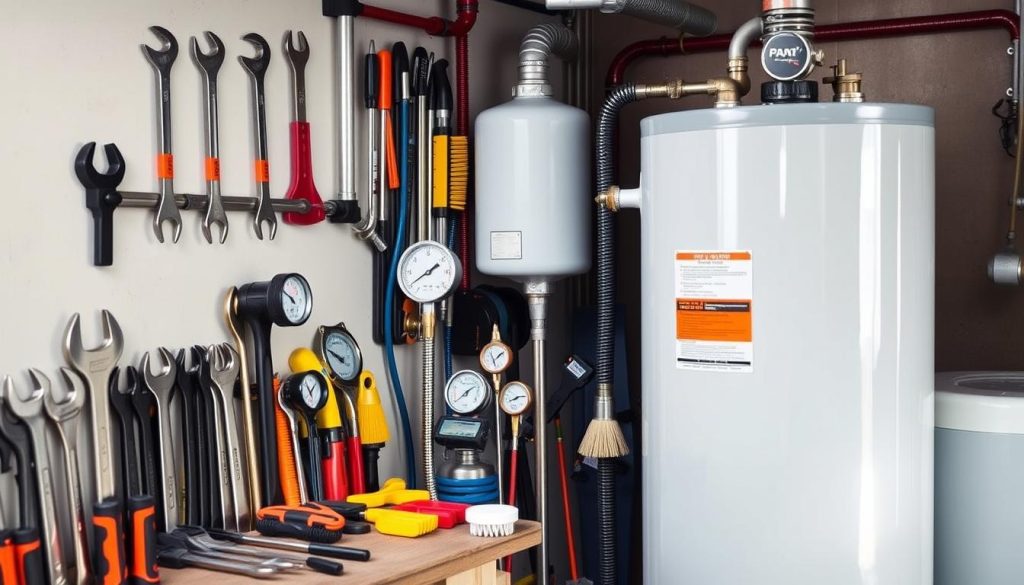
Maintaining your water heater well is essential for its productivity and longevity. Routine maintenance and inspections can prevent costly repairs and keep your hot water running properly.
Regular Pro Inspections
You need to have your water heater inspected annually. Officials say it is crucial to detect problems early. They suggest yearly checks to:
- Look for leaks and corrosion
- Test the pressure relief valves
- Check the electrical connections
- How effective is the system?
Periodic System Flushing
Sediment build-up may reduce your water heater’s energy efficiency. It can get rid of these deposits for you by flushing it out regularly, ensuring it continues running smoothly. Experts recommend draining a quarter of the tank every couple of months to prevent sediment buildup.
“Regular maintenance can actually add years to the life of your water heater.”
Key Maintenance Strategies
- Replace anode rod when only core wire is left exposed
- Keep water at 120 degrees Fahrenheit or less.
- Insulate your tank and pipes
- There should be at least a 2-foot radius clear around the unit
By adhering to these maintenance tips, you can prevent an unexpected breakdown, save money on energy bills and ensure that your hot water continues to flow.
Common Problems and Troubleshooting

Maintaining your water heater is a key to prevent problems that is unwanted. Homeowners face countless small problems every day that need quick fixes or even professional attention. It’s good to be aware of the common most water heater problems you may be able to fix them before they become bigger issues. The majority of problems can be grouped into two main categories: low water pressure and leaks.
Low Water Pressure Obstacles
Hot water can get fucky with low water pressure. Several things can cause this:
- Sediment buildup in the tank
- Blocked pipes or valves
- Faulty pressure relief mechanisms
“The most common problem for water heaters is sediment build”, this build up will effect not only performance but efficiency.”
Troubleshooting Leak Issues
Water heater leaks demand swift attention. Check these areas first:
- Pressure valve connections
- Tank integrity
- Inlet and outlet pipe joints
Some leaks are just condensation, and this isn’t a very big issue. Routine maintenance can identify and prevent leaks before they occur.
When to Call a Pro?
Some problems you can handle on your own, but others are best left to the experts:
- Persistent tinted or foul-smelling water
- Complete lack of hot water
- Tank is visibly damaged or highly corroded
- Odd sounds coming from the hot water tank
Frequent maintenance can help keep your water heater running longer, often extending its useful life to between eight and twelve years. Be sure to read your warranty and call in the experts for big repairs.
How Does a Boiler Hot Water Heater Compare to Other Systems?
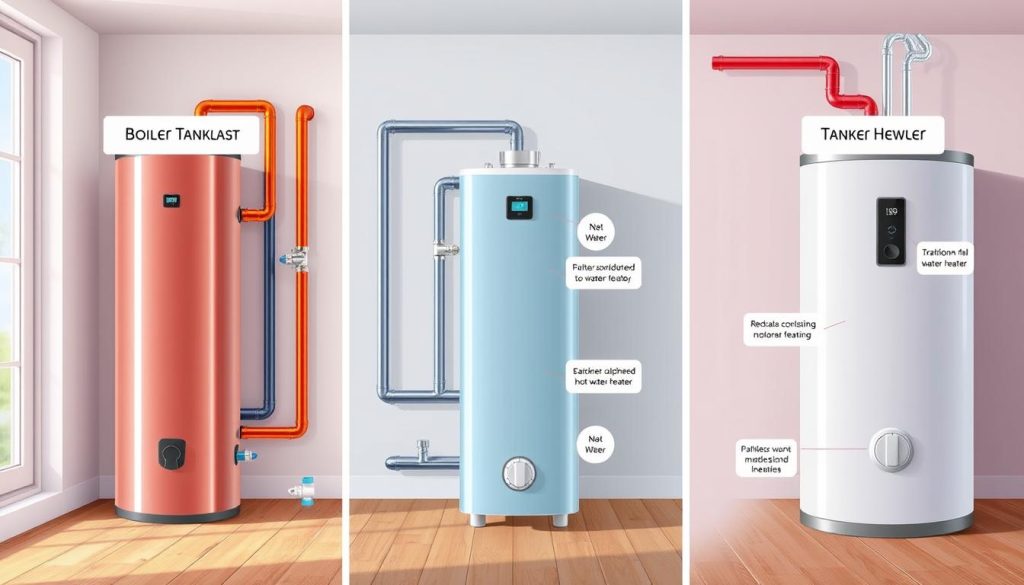
Selecting the appropriate water heating system for your home You have several options available, such as the tankless, electric and conventional boiler systems. Home water heating has come a long way. Each approach has its positives and negatives.
Tankless Water Heaters: On-Demand Efficiency
Tankless water heaters are modern-day answer. They heat water on demand, not continuously, so they use less energy than traditional tanks.
- Provide instant hot water
- Up to 20 years usually gone by
- Outputting 2 gallons up to 5 gallons per minute
- More energy-efficient design
Traditional Storage Heaters: Reliability Over Efficiency
Traditional electric water heaters are found in most modern homes. They hold hot water at the ready, but they are less efficient than newer systems.
- Holds 20 to 80 gallons of water
- Average lifespan of 6-15 years
- Lower upfront installation costs
- Risk of hot water shortage at peak time of use
“The right water heating application is very much specific to your household, your budget, and the long-term efficiency goals you may have. – Home Heating Expert
Bearing these systems in mind, consider the costs, energy usage and regular maintenance. Tankless heaters run $1,000 to $3,000 to install. Classic models cost $500 to $3,000.
| System Type | Average Lifespan | Installation Cost | Energy Efficiency |
|---|---|---|---|
| Tankless Water Heaters | 20 years | $1,000-$3,000 | High |
| Traditional Storage Heaters | 6-15 years | $500-$3,000 | Moderate |
Whether to go with tankless vs traditional water heater systems will usually come down to your home, budget and energy goals.
Energy Efficiency and Your Home
Water heaters are energy guzzlers, accounting for nearly 20% of your household’s energy use. Opt for energy-efficient water heaters for your house.sendRedirect(rawtypes is the powerful Ametek Lamb that spins furiously, you really are making one energy-efficient decision here, Since it’s probably going to last longer than you are, Your new vacuum is HEAVY – so just be aware that this is not one of your cheap piece of crap vacuums, range hood and lighting. Nowadays, people want to save money and save the planet. One way to increase the energy efficiency of your home is to put in a new water heater.
Significant Energy Bill Savings
When consumers use ENERGY STAR certified products, they are helping keep homes cool and comfortable while using less energy and producing fewer greenhouse gas emissions than typical products in the market.What do the Ratings Mean?ENERGY STAR is a government backed standard for energy efficient products and services, so consumers can know which products to choose, without sacrificing features, style, or comfort.When you use less energy, the power plants produce less pollution too.
- They use less (up to four times less) energy than the old-fashioned ones
- They reduced energy consumption by 70%
- They could save you $550 a year
- Over $5,600 is saved in ya lifetime
“Selecting an energy-efficient water heater is good for the planet and your wallet.”
How To Calculate Efficiency
- Energy Factor (EF) Rating
- Uniform Energy Factor (UEF)
- Annual Operating Costs
- Potential Rebates and Tax Credits
When selecting a water heater, consider the overall cost over time. They’re often more expensive on the front end but save you money in the long run. Pro tip: Check with your local utility company for rebates on energy-saving water heaters.
Boiler Hot Water Heaters Cost Analysis
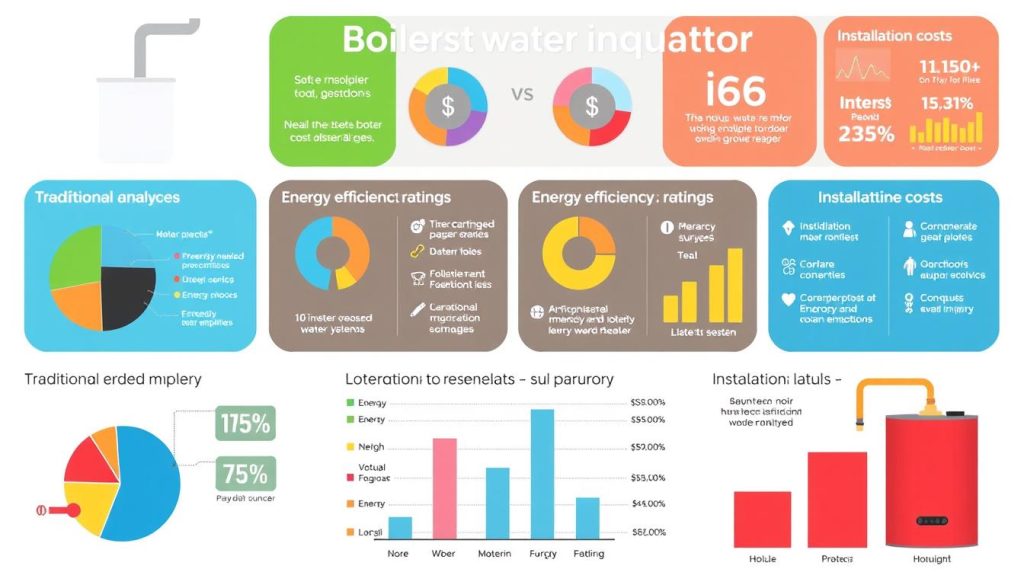
Water heater installation and replacement can be expensive, which is why homeowners need to know how much they should expect to pay. The type of hot water system you choose can make a big difference to your energy bills and your budget.
Up Front Costs Versus Long-Term Savings
The price tag for a new water heater may give you a bit of sticker shock at first. But, choosing the correct one can reduce a lot of spending in the long run. And new water heater technologies are using more energy, resulting in lower bills.
- Average water heater life span: 10 years
- Projected Energy Savings per Year: up to $300
- Use less energy: Save up to 34% compared to a minimum efficiency cooling unit
Typical Installation Costs
The cost to install water heaters differs. You’ll pay from $1,000 to $1,700 or so for a full electric system. That price gets you the equipment and professional installation.
| Water Heater Type | Equipment Cost | Installation Cost | Total Investment |
|---|---|---|---|
| Standard Electric | $300-$700 | $700-$1,000 | $1,000-$1,700 |
| Heat Pump System | $1,000+ | $700-$1,500 | $1,700-$2,500 |
Pro tip: Spending money on energy-efficient water heaters can save a great deal in the long run — often, the initial investment is recouped in just three years. Energy efficiency is not only for the “green” amongst us who want save money, but even moreso, reduce your home’s greenhouse gas emissions.He didn’t like saving money and you do not have the energy to do the work.(SGM)
Ecological impact of your Boiler Hot Water Heaters
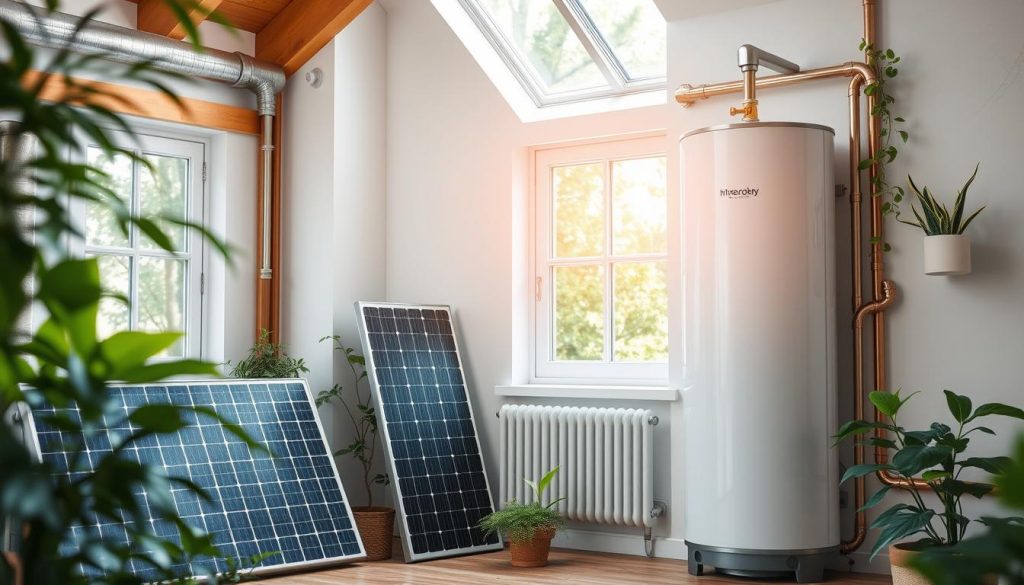
Energy-Efficient Water Heater Technologies Water heating is not only significant in determining how green our home is, but how much energy we use at home. We need to get our act together and use energy efficient hot water heaters to reduce carbon emissions and for the sake of the earth.
Strategies to Reduce Carbon Footprint
Gas boilers that produce heat and hot water often have emission levels that force about 2,200 kg of CO2 into the atmosphere every year. And homeowners can reduce their environmental ill effects by savvy water heating strategies.
- Opt for energy-efficient water heaters with high Energy Star ratings
- Turn your water heater down 10 degrees for a 3-5% savings on your energy bill each year
- Implement water-saving techniques and insulation
Advantages of Renewable Energy
Renewable energy technologies supplement water heater sustainability and environmental performance.
| Water Heating Technology | Energy Efficiency | Annual CO2 Reduction |
|---|---|---|
| Solar Water Heaters | Up to 50% cost reduction | Minimal direct emissions |
| Heat Pump Water Heaters | 70% less energy consumption | Significant emission reduction |
| Electric Tankless Heaters | 10% additional Energy Star savings | No direct greenhouse gas emissions |
Water hea1 taoshk:systems also provide a very significant opportunity for homeowners to reduce their impact on the environment and save energy. Water heater safety: Water heater and energy savings go hand-in-hand. By choosing cutting-edge technologies and smart usage, homes can reduce their carbon footprint and ensure hot water continues to run smoothly. Where water heating is concerned, renewables are almost always the best way to go, both for the planet and for saving money in the long term.
Choosing a Reputable Brand
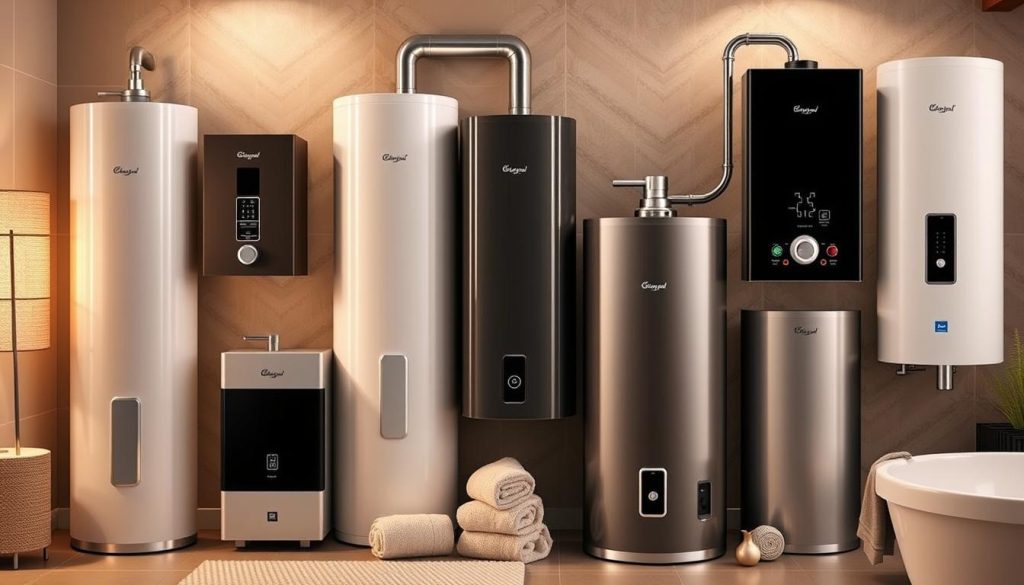
One of the most important factors in being satisfied long-term with your water heater is by choosing the right water heater brand. The market is full of many top brands which are known for quality, innovation and customers’ satisfaction.
Top Water Heater Brands in US
When you are considering a new water heater replacement in USA, you have a lot of choices to make. Here are some of the major water heater brands in the US:
- Bradford White: American brand, in business since 1881, offer tank, and tankless water heaters
- Rheem: Estd. 1925, they offer a variety of water heater products and technologies
- Navien: A global leader with the most innovative technology
- Kenmore: Offers high-efficiency hybrid water heaters
Comparative Analysis of Leading Brands
| Brand | Founded | Water Heater Types | Average Lifespan |
|---|---|---|---|
| Bradford White | 1881 | Tank, Tankless | 10-15 years |
| Rheem | 1925 | Tank, Tankless, Hybrid | 10-20 years |
| Navien | 1978 | Tankless, Hybrid | 15-20 years |
Customer Reviews & Ratings
When choosing a water heater, customer feedback is crucial. Look for brands with:
- Consistent positive ratings
- Strong warranty coverage
- Responsive customer support
- Availability of replacement parts
“Buy a reliable brand of water heater, and you’ll spend much less in the long run.
Research and knowledge about what each brand provides allows you to make an informed investment for your needs.
Local Regulations and Standards
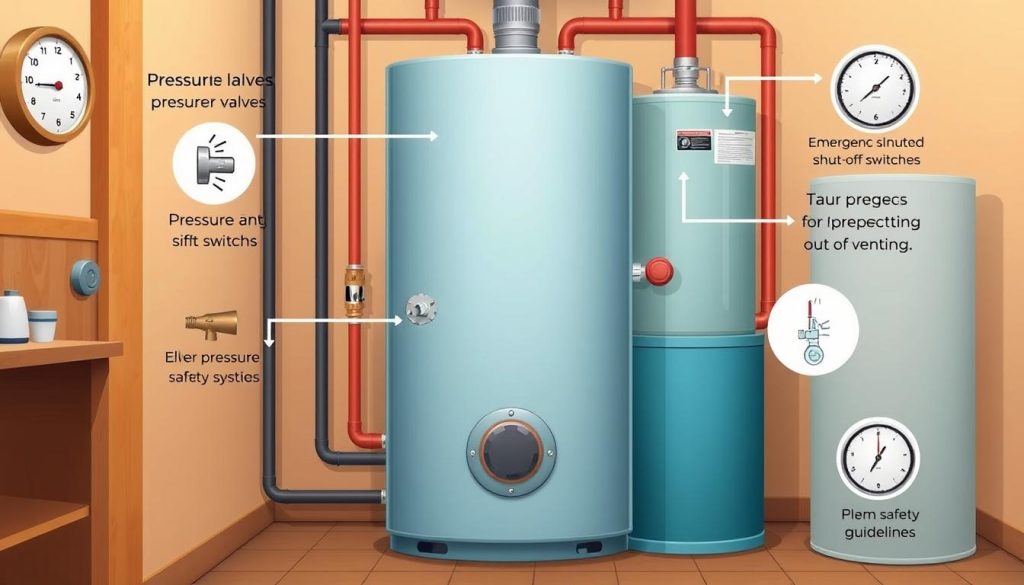
When it comes to the understanding of water heater safety and installation, you need at least a deep understanding of the local codes, rules, and regulations. Homeowners need to fully appreciate how essential it is to follow these rules. This guarantees that your water heater operates properly and is safe. There are a ton of rules when it comes to installing a water heater in order to protect you and your home. These local and national standards are the rules that keep your water heater running safely. They also reduce the likelihood of any trouble.
Key Building Codes for Water Heater Installations
- Clearance for water heater units Maintenance work around water heater units at bottom
- Venting & combustion air language
- Requirements concerning the materials of catch pans and protective equipment
Your water heater is a simple appliance. Building codes provide precise standards for water heater safety. For instance, NFGC regulations determine distinct gaps:
| Location | Minimum Clearance |
|---|---|
| Side and Rear | 4 inches |
| Front (Service Access) | 24 inches |
Safety Rules and Required Safeguards
There are numerous water heater safety rules that need to be followed during installation and operation. Key safety standards include:
- 140°F maximum temperature limit to prevent scalding
- Mandatory drain valve specifications
- Emergency controls for mechanical, electric and gas systems
Go by the book: It’s not just a good idea to follow local codes when installing water heaters—it’s the law.
Homeowners should consult with local building departments or water heater professionals. This means that they can easily adhere to all security guidelines. Understanding these rules protects your investment, and ensures that your water heater operates safely.
Upgrading Your Existing System
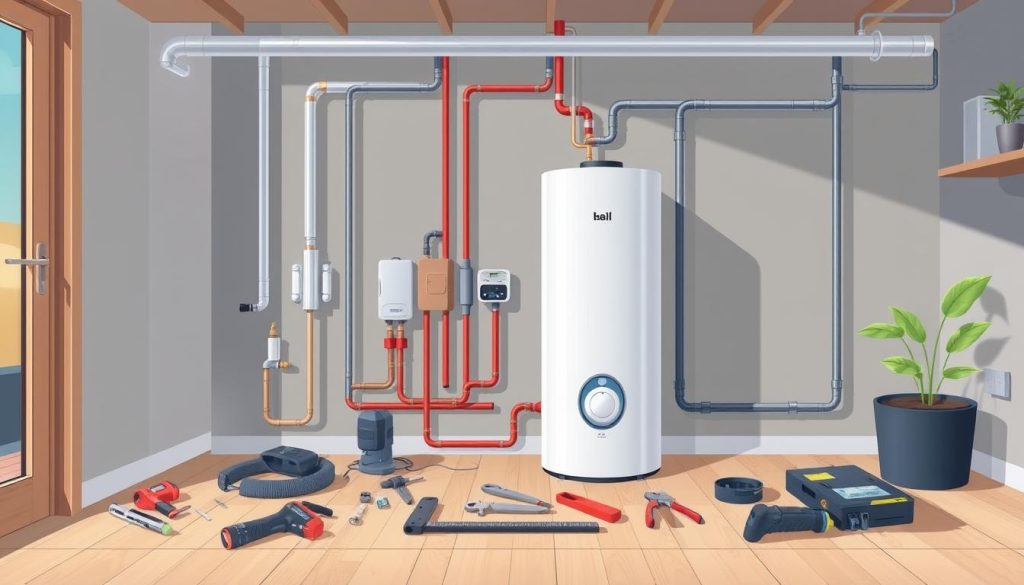
Water Heater Replacement Guide for HousesReplacing your water heater is a big decision for homeowners. It can increase the energy efficiency and performance of your home. Knowing how and why to switch it out can help save money and prevent system failures. Determining when to replace your water heater requires you to consider a few key factors:
- Age of system (10-15 years old or so)
- More repairs needed
- Less hot water than before
- Higher energy bills
When to Upgrade
Efficient water heaters are an improvement over old. Here are some signs that point to your current water heater needing to be replaced:
- You can never get warm water when you want cold
- Water is rusty in color or doesn’t taste good
- You experience loud popping or crackling noises
- You see corrosion or leaks
Benefits of Upgrading
Other than being a reliable gas water heaters, choosing one of our energy-efficient water heaters can expand your home’s comfort as well as your savings on energy. New systems offer big improvements:
| Upgrade Benefit | Potential Impact |
|---|---|
| Energy Savings | Can save up to 15% on energy costs |
| Performance | Always has hot water ready |
| Environmental Impact | Emits less greenhouse gases |
| Cost Efficiency | Could save around $250 a year |
“There is a cost to improve your water heater, but recognize, it is an INVESTMENT in your home’s efficiency and comfort.” – Energy Efficiency Specialist
Before you decide, talk to HVAC specialists. They can do a status check on what you need and provide information on the best energy-efficient water heaters for your home.
What’s Next For Boiler Hot Water Heaters
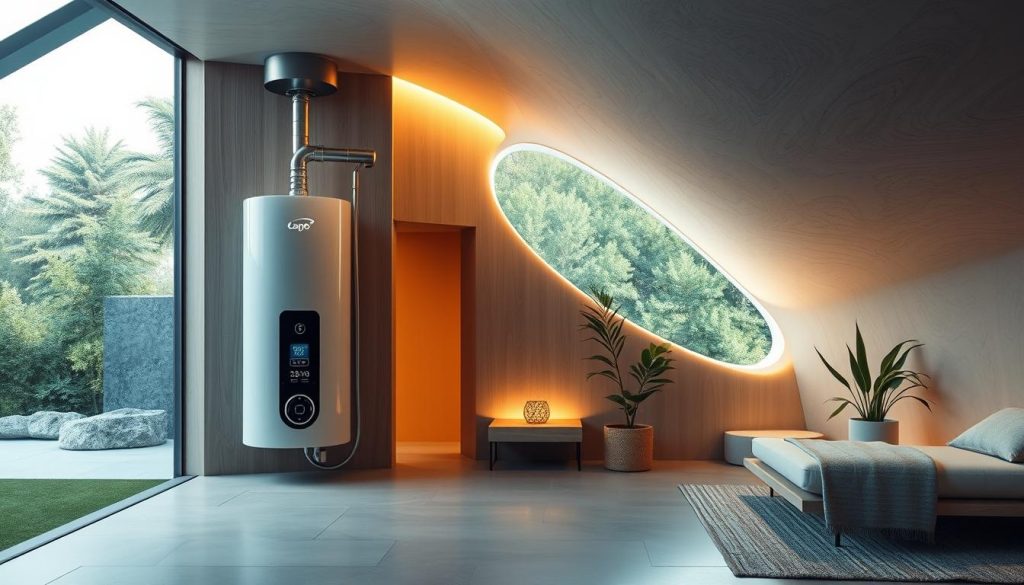
Future of Energy-Efficient Water Heaters\n\nThe landscape of energy-efficient water heaters is changing quickly. New tech and green goals are lighting up the way. Homeowners and experts envision monumental changes ahead, such as increased efficiency, reduced energy use, less harm to the planet. New trends in water heater installation are transforming the way we think about home energy. Key changes include:
- Dynamic control technology ensure better performance
- When that\’s the case, you\’ve got options:Enhanced heat pump water heating technologies
- Renewable energy integration
- Grid-interactive water heating systems
Technological Innovations Pushing Change
There are some big tech leaps in the world of water heating. opyright: NY Times Heat pump water heaters are gaining popularity. Interest is increasing at companies like A. O. Smith. Such systems employ the heat of the air to warm water, which allows them to save lots of energy.
| Technology | Energy Savings | Environmental Impact |
|---|---|---|
| Heat Pump Water Heaters | Up to 60% reduction | Significant CO2 emissions decrease |
| Grid-Interactive Systems | Potential $200 annual savings | Improved grid stability |
| Smart Control Technologies | 15-25% efficiency improvement | Reduced energy consumption |
Energy Efficiency Trends
Regulations are driving a higher use of energy-efficient water heaters. America’s power sector is preparing for a seismic shift: With coal and nuclear power on a tightrope, gas is the past. Places like Washington and Denver are thinking of electric. This shift is greening up homes.
“The future of water heating is electric, smart and sustainable.” – Energy Efficiency Expert
Water heater installation is more and more advanced. Now, we are witnessing hybrid systems that are combining old and new tech. They reduce greenhouse gases, while still retaining reliability.
Frequently Asked Questions
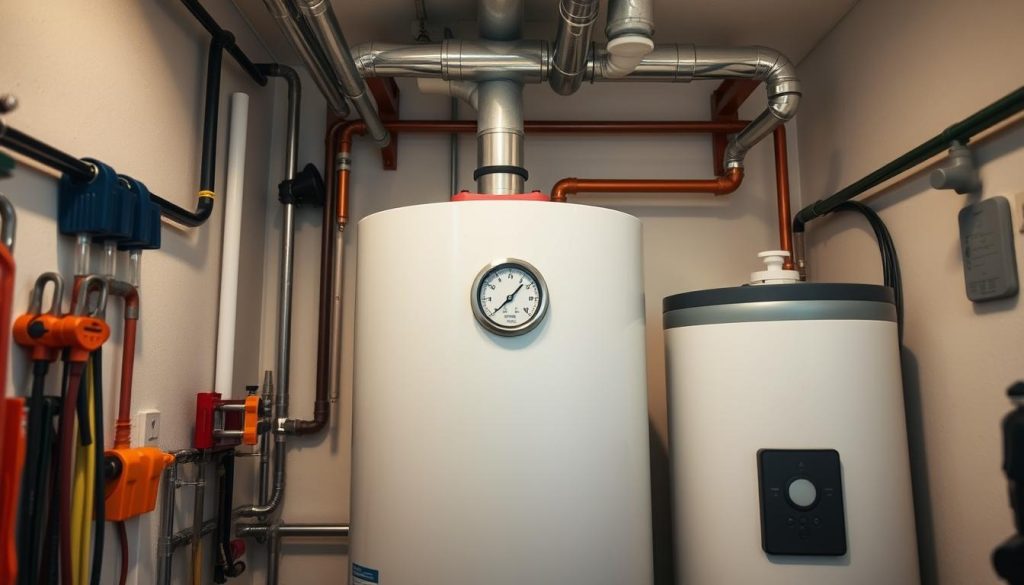
So, what about water heater maintenance?Homeowners are regularly asking about uptimate water heater repair advice and home water heater maintenance!Common water heater problems. Understanding how boiler hot water heaters function makes installers fantastic candidates when choosing a heating house system.
Top Questions Homeowners Ask
- What is the average life-span of a boiler system?
- What are the most critical upkeep demands?
- When is it time to change my boiler?
Lifespan and Maintaining Tips
Boilers typically last 15 to 20 years. They should be checked every year. Maintenance can extend the life of your system Mennecke said one way to help your system last longer is regular maintenance, purchase any extra filters that are needed on a regular basis and stick to the schedule, Mennecke said.
Inspection and Safety Considerations
| Inspection Type | Frequency | Purpose |
|---|---|---|
| High Pressure Boilers | Annual | Ensure safety and efficiency |
| Low Pressure Boilers | Every 2 Years | Prevent equipment failures |
| Pressure Vessels | Every 3 Years | Check structural integrity |
Best Sources for Further Information
For guidance, consult professional contractors. The U.S. Department of Energy’s Energy Saver site has plenty of details about boiler systems, while the ENERGY STAR program offers recommendations for energy-efficient boilers.
“Regular Boiler Inspections are necessary to ensuring proper function of your boiler and All life and work as well.
Professional Help Tips
If you need water heater repair or if a maintenance procedure is too complicated to complete on your own, it’s best to call in a certified pro. Who knows what sort of problems and assorted safety hazards a DIY repair can lead to?
- Contact licensed boiler inspection professionals
- Schedule regular professional maintenance
- Maintain good records Keep data of all examinations and repairs
Conclusion: Choose Wisely!
Choosing a new hot water boiler or heater is a big decision. Cost-effective water heaters can reduce your energy costs while helping to keep your home comfortable. Professionals will assist with finding the best heating option. When considering a boiler, consider what type of efficiency it offers, how much hot water it can produce and how long it will last. Choose the best boiler hot water heater system and save yourself money in the long run. Having an idea of how much hot water your family uses can help prevent you from getting a system that’s too big or small. There are also asides for technical information, it’s just that they’re swamped by the practical.
